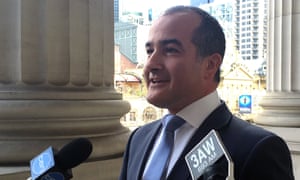
The Victorian government has pushed for a greater role for states in designing a new education funding model and rejected federal school reforms that interfere with state responsibilities.
The Victorian education minister, James Merlino, has written to his federal counterpart, Simon Birmingham, offering support for key planks of the federal government’s education quality reforms, including improving transparency and increasing teacher quality.
But in the letter, seen by Guardian Australia, Merlino warns that the current level of funding the federal government has committed to after 2018 would leave the state about $1bn worse off in 2018 and 2019, compared with the national education reform agreement negotiated with the previous Labor government.
Education ministers are due to meet on 16 December and will discuss a new funding model to apply from 2018, although no decision will be made until the federal government proposes a new model in 2017.
Merlino called on the federal government to return to the funding level in agreements Birmingham is keen to renegotiate, arguing that inconsistencies entrench disadvantage in some states and school systems.
Merlino offered that the Victorian education department work with the federal department to discuss the school resource standard and possible funding models, suggesting a greater role for the state.
He also said the state and territory education ministers should “play a key role” in developing the new school funding arrangement.
The current plan is for the federal government to propose a funding model which will then be discussed and approved at the Council of Australian Governments meeting among premiers and the prime minister.
Birmingham has argued that OECD research suggests beyond a certain strong level of funding, higher spending on education does not guarantee better student performance.
But Merlino wrote that “local and international evidence clearly demonstrates that additional funding, when directed to the right things, can and does improve teaching and learning outcomes”.
Cuts to projected funding growth “will disproportionately affect the students who need it most”, he said.
Merlino committed to constructive engagement on a new funding agreement, but said the role and autonomy of states as system managers had to be acknowledged.
“The commonwealth’s policy conditions cover a range of specific and detailed operational issues that sit with areas of state responsibility,” he warned.
Merlino said Victoria would not sign up to conditions that:
- extend into state areas of responsibility over its workforce
- duplicate existing Victorian reforms
- affect supply and demand of teachers or set unrealistic targets for recruitment
- are administratively burdensome or their costs are out of line with additional funding
- or prescribe the way reforms are implemented in Victorian schools.
The list of demands particularly affects federal conditions mandating a minimum proportion of trainee teachers specialise in literacy and numeracy and recruitment targets for other specialties.
Victoria is concerned federal conditions will either replicate their own reforms or be counterproductive and lower their standards in areas like early childhood language education.
Birmingham said: “The Turnbull government has committed to working with states and territories and the nongovernment sector to establish a new funding deal post-2017 that is tied to evidence-based school improvement initiatives and will see funding distribution informed by need.”
Birmingham denied there were any cuts to school funding, pointing to the increase in school funding from $16bn in 2016 to $20.1bn in 2020.
“What is truly surprising is the hypocrisy involved, given the Andrews government won’t even commit to funding their share of the final two years of the hotchpotch of deals that constitute current school funding arrangements,” he said.
The Victorian government has funded its contribution to needs-based funding for 2015 to 2017 and has undertaken a review to determine funding for 2018 and beyond, but blames uncertainty in federal funds for difficulties planning its spending.
Birmingham said Victoria invested less per school student than other states, and called on them to boost their contribution to levels of the others, like Western Australia.
He labelled release of the letter “a distraction” by Merlino, but committed to work to implement quality reforms.
[Source:-The Hindu]



